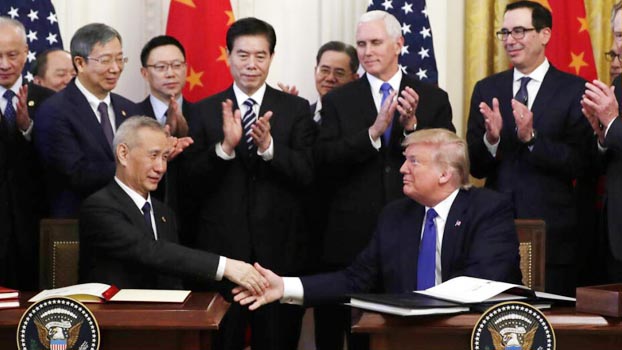The age of geoeconomics is upon us

The United States and China managed to agree on a “phase-one” trade deal in December. For now at least, the two countries have reached a truce in the trade war that had been launched by the administration of U.S. President Donald Trump.
Washington appears to have no intention, however, of halting its efforts to eliminate China’s Huawei corporation from the next-generation 5G telecommunication networks in the U.S. In fact, the struggle between the two countries for hegemony in certain strategic technologies, including semiconductors, artificial intelligence, quantum computing and biotech, is likely to gain in intensity going forward.
Finance, investments and currencies will be swept up in the maelstrom of the U.S.-China struggle for supremacy. Infrastructure investment will expand their respective spheres of influence through connectivity. Reserve currencies will produce network effects and sustain financial controlling power. The SWIFT payment system already allows the U.S. to impose monetary sanctions with immediate effect.
The struggle for supremacy between the U.S. and China has led to the weaponization of economic interdependence, and risks the global decoupling of supply chains. During the Cold War, the Soviet Union posed a military challenge to the U.S., but today China is aiming to make the economy the principal battlefield.
Meanwhile, following the botched Iraq war the U.S. has demonstrated a pronounced weariness with overseas military interventions. It is increasingly inclined to use economic measures to apply pressure on other countries.
A new trend is emerging: Countries are using economic strength to achieve a balance of power. They are incorporating economic strength into their development of deterrent power. They increasingly invoke economic sanctions, rather than military force.
The age of geoeconomics — the deployment of the economy for geopolitical purposes — is upon us. The term “geoeconomics” came into use in the post-Cold War era, but as early as in 1968 geopolitical scholar Zbigniew Brzezinski of Columbia University wrote of the development of electronic — and particularly computer — communications:
“Unlike the revolutions of the past, the developing metamorphosis will have no charismatic leaders with strident doctrines, but its impact will be far more profound. … Power will gravitate into the hands of those who control the information and can correlate it most rapidly. … This could encourage tendencies during the next several decades toward a technocratic dictatorship, leaving less and less room for political procedures as we now know them.”
With the advent of globalization and the internet, the post-Cold War era has made Brzezinski’s predictions a reality. Today digital space is where the fiercest geo-economic struggles are unfolding. In the 2020s, we are likely to confront four “mega” geo-economic challenges.
First, within China’s autocratic political structure, “illiberal innovation” in the most cutting-edge technologies of the Fourth Industrial Revolution (AI, block chain, big data, biotech) will make China a technological superpower. Second, connectivity powered by the China-financed “Belt and Road” initiative will expand the nation’s sphere of influence across Eurasia and Africa.
Third, intensifying climate change will separate the world into “winners” and “losers.” Group of 20 countries such as India, China, Brazil, Saudi Arabia, South Africa and Australia will all become “losers” in the 2030s and 2040s, threatening global stability.
Fourth, the disintegration of the U.S.-led international order will accelerate. Over the past decade, both China and Russia have disregarded international law and used their power to force changes to the status quo in the South China Sea and Crimea. Meanwhile, the U.S., under Trump’s “America First” policy, withdrew from the Trans-Pacific Partnership, the Paris climate agreement and the Iran nuclear deal. The U.S. has almost delivered a farewell letter to the World Trade Organization.
Power is now eclipsing rules. For much of the postwar period, this kind of naked power was suppressed by economic growth, faith in markets, economic interdependence, globalization, and above all else, the rules-based international order. Now, however, this seal is loosening.
The age of geoeconomics will pose a grave test for Japan, which depends on imports for many natural resources, including oil. An end to “freedom of navigation” will pose the greatest threat to Japan’s economic security. Given the country’s dependence on trade with both the U.S. and China, it will be left hamstrung in the event of their decoupling. Japan’s relative weakness in platform and digital innovation means it will lose out in any competition for big data.
In April, Japan’s National Security Council will launch a team for economic affairs. Not only will this new team have to deal with such issues as 5G, undersea cables, energy, the BRI and international finance, but it will also have to address these four “mega” geo-economic challenges.
To do so, they must change what a top Finance Ministry official described as a “lamentable tone-deafness on security” within the Internal Affairs and Communications Ministry, which oversees communications networks, and the Finance Ministry, in charge of matters of currency and finance. In particular, they will need to overcome the territorialism and foxhole mentality among Finance Ministry bureaucrats.
If Japan hopes to fight to the bitter end in this new age of geoeconomics, it must begin by abandoning the turf mentality that prevails in its government bureaucracy.
Yoichi Funabashi is chairman of the Asia Pacific Initiative and a former editor-in-chief of the Asahi Shimbun.
Source: Japan Times



